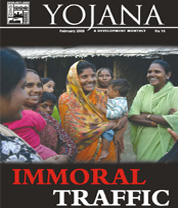 |
|
 |
COVER
STORY |
 |
|
| |
| |

|
|
Tapping Sustainable Energy Alternatives
|
|
|
The second lead article, which is also focus article, is written by Shri N Bhadran Nair. Citing a report of the World Health Organisation, the author has advocated for tapping sustainable energy alternatives
|

|

|

|

|
|
Financing Renewables in India
|
|
|
The third article is written by Shri P C Maithani, Adviser, Ministry of New and Renewable Energy. He has focussed on renewable energy resources
|

|

|

|
|
Steps to Achieve India’s Solar Potential
|
|
|
The special article is written by Sumant Sinha, Chairman and Managing Director of ReNew Power. He opines that India must also honour its global commitments on curbing greenhouse gas emissions
|

|

|
|
 |
Lead Article
Textiles the word brings up images of beautiful drapes cotton, silk, chiffon, lace. Whether it is the material draped on the figurine of the lady from Mohenjadaro, the stylish drapes of Cleopatra, the ball dance gowns of the Victorian Era or the lovely dresses worn by our own queens and princesse...
read more... |
|
 |
|
|
|
|
|
|
|
Immoral Traffic
|
|

With the formal approval by the National Development Council (NDC), the Eleventh Five Year Plan (2007-12) is now complete. The finalization of Plan before the end of its first year is appreciable. Let us consider two important issues which are crucial. The first is the importance given to the private sector in the areas which have been the domain predominantly of the public sector. The most important is the infrastructure on which the Prime Minister has focused from the initial days of the UPA government. Apparently involvement of private sector in education is also on the cards. The role of private sector is through public-private partnership model (PPP). The second issue is on recognizing the importance of increased government expenditure on services in social sector and the focus on improving the public delivery of services. Yojana reports on the deliberations of NDC.
Now on the theme "Immoral Traffic". The Union Government is all set to amend the
Immoral Traffic (Prevention) Act. In India, the legal regime on sex work is laid down under the
ITPA. In this issue of Yojana, experts look at the proposed amendments and also analyse
social, health and economic issues relating to sex work. Sex work in India, as in the rest of the world, employs a large
number of people. Most of sex workers enter the profession involuntarily, being forced into it either because of poverty,
abandonment or violence by husbands, or the other family problems. They are usually contractually obligated, in a form
of bonded labour, to work in a brothel under the ownership of a madam or pimp.
The profession has received increased attention from social scientists in recent years because of the AIDS epidemic.
This is particularly true in India where sex workers are at very high risk for the disease and transmitting it among other
clients. Promoting the use of condoms and other safe sex practices among sex workers is considered perhaps the most
effective method of preventing the spread of the disease.
The findings of "The Oxford Companion–The Economics In India", indicate an interesting fact on the economics of
sex work. Returns to education in this profession are comparable to those of women who work in more conventional
occupations. Sex workers with primary education earn about 4% more than those with no education, while those with
middle schooling earn about 22% more. This reflects the segmentation of the market with more educated sex workers
catering to more educated clients. However, unlike other professions, age shows a sharp negative relationship with
earning capacity.
The former RBI Governor and Chairman of the PM's Economic Advisory Council, C. Rangarajan has been actively
involved in the Pan-Asian Commission studying the impact of HIV/AIDS in Asian region. He met sex workers in Kolkata,
Chennai, Bangladesh, Thailand and Phillipines. He visited the Sonagachi Sex workers' Project in Kolkata, which has
been hailed as a model project for bringing down the rate of HIV infection and stopping child trafficking because of the
active participation of the sex workers. Such results highlight the need to intensify programmes that create an enabling
environment for sex workers.. The need is to have a development approach.
The government through ITPA should encourage self-help groups that will monitor trafficking in sex work and
organize the community to manage its own health needs, education for dependent children etc. There is a need for
systematic training and capacity building and further strengthening the legal process for the protection of victims.
|
|
|
|
|
|
|
|
|
|
|
 |

|
|
 |
|
|
 |
|
Regular
Column |
 J&K Window : J&K Window : |
|
|
 Do you know? : What is Forensic Auditing Do you know? : What is Forensic Auditing |
|
Forensic auditing refers to the auditing with the main aim to employ accounting techniques and methods to gather evidence to investigate the crimes on financial front such as theft, fraud etc.
|
|
|
 |
|
 |
 |